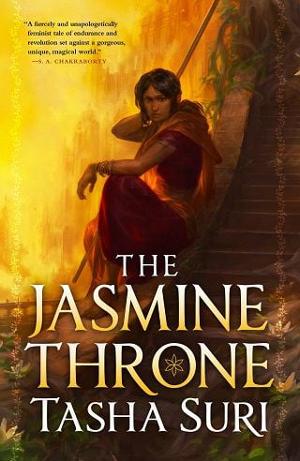Chapter 33: Priya
PRIYA
She climbed the Hirana with her eyes closed, the wind biting her cheeks, her hair catching in the breeze. At one point she stopped, pressed her head to stone, hooked a foot into a crook of broken rock and moss, and used her free hands to loosely plait her hair.
There. Much better.
What would Bhumika say if she saw me now?Priya thought, with no small sense of amusement. Balanced on a deathtrap with nothing but my thick head? Perhaps Bhumika would enjoy the excuse to yell at her.
When she entered the Hirana—slipping through quiet halls, under the shadows thrown by the guttering lanterns—she checked on Malini.
She was asleep. There was color in her cheeks; something easier about her form. And the minuscule dose of needle-flower Priya had left for her had been taken.
Perhaps she’d survive after all.
Priya lowered her head to the weave of the charpoy at Malini’s side. Listened to her breathing—the steady, comforting rhythm of it.
And entered the sangam.
She’d avoided this for longer than she should have. The thought of seeing Ashok again had made her chest burn with an echo of pain, the memory of betrayal. But what scared her most was the falsely kind way he’d looked at her and spoken to her, in the moments before she’d flung herself beneath cosmic waters and returned to her flesh.
He’d hurt her for love. That was the way of strength, in their family.
She opened her mouth. Called for Bhumika in the fathomless winding of waters. She had howled for Ashok; this was something quieter. A beckoning.
And Bhumika came. She rose, a shadow spooling out of the water.
“Tell me,” Bhumika said simply.
She told Bhumika everything as succinctly as she could. She spoke of her pact with Malini; of her meeting with one of Malini’s allies, and of Malini’s efforts to see Emperor Chandra replaced on the throne by his brother, Aditya.
“So war comes for us no matter what,” Bhumika said. “Parijatdvipa turns upon itself. We’re in an even greater mess than I thought.” She sounded tired.
“What will you do?” Priya asked, thinking of the general, the children housed in the mahal. The future.
“I don’t know. I don’t have the power to fix everything, no matter how capable I may seem.”
“That isn’t what I meant.”
Bhumika clicked her tongue, as if to say, It doesn’t matter. “I should be asking you how you fare. Ashok harmed you.”
Priya resisted the urge to touch a fist to her chest, to the place where Ashok had shoved his hand into her soul and twisted.
“I know Ashok is strong. That he can be dangerous when he needs to be. I just thought…” Priya stopped.
“You thought he was still a good man, beneath it all.”
“He is a good man,” snapped Priya. Then she forced herself to stop again, and looked away from Bhumika, at the winding cosmos around them, liquid and strange. If he was not good, how could Priya be good? How could any of them?
“You remember the boy he was,” said Bhumika. “You don’t—see—the man he is now.”
“I remember that he saved my life. That he cared for me. Sometimes I feel like I can almost remember that night and I cannot hate him because…” Her voice cracked. “I don’t like to talk about my feelings. I don’t like any of this, Bhumika, and I swear if I could rip this anger out of me, if I could not feel what I feel, if I could erase that night entirely—”
“I know,” Bhumika said. “I know. Do you remember how I would bring you up to my rooms and speak with you alone, from time to time, when you first came to the mahal?”
“You always had sweets,” Priya said immediately. It was her strongest memory of that time. After years of starvation, she’d had a strange preoccupation with hunger. “Once you even had rasmalai. Covered in rose petals.”
“I convinced Vikram I was brooding for a child,” Bhumika said. “He liked that idea. So I had sweets for you, yes. And time for you, Priya. For a little while.” A hesitation. “Pri. I did try to be family to you. I really did.”
There was something aching in Priya’s chest.
“I know,” she said, with difficulty. “I do know that. You shouldn’t listen to me when I’m angry. Or at all. I’m never particularly fair to you, Bhumika.”
“Is that an apology?”
“No,” said Priya. “This is an apology: I’m sorry. Savor it, because I’m not going to do it again.”
The apology dropped between them heavily, awkward as a stone.
“Please don’t,” Bhumika said finally. There was something softer in her voice, as she shifted in the water, as it rippled soundlessly around the shadow of her. “You—and you won’t remember this, I expect, Priya—you were so quiet when you first came to the mahal. Not… shy. But unwilling to speak. I would try to talk to you about our childhood. About the Hirana. About how you and Ashok had escaped. You refused to tell me anything.
“I thought at the time that it was trauma. You were a child. You were frightened and hurt and abandoned. But now, I think not. You made a choice, Priya. There was something you wanted to discard.”
“You can’t know that.”
“I know how stubborn you are. You’ve never obeyed me,” Bhumika said. “Not really. There is something in you that is… elemental. As there is in Ashok.”
“Are you saying I’m like him?”
“I’m saying that you’ve sought the deathless waters. Allied and broke with Ashok. Made a pact with a princess of Parijatdvipa—all without me, of your own volition. You follow a path I can’t walk, Priya, and you never look back at what you leave behind.” She spoke gently. It only made the words cut more deeply. “You’re driven by a moral code I can’t fathom. In your own way, Priya, you’re as dangerous as Ashok. Yes. I should have recognized that about you long ago.”
Bhumika’s sense of who Priya was—the fact that she saw Priya as some kind of staggering, strange, fierce, and elemental creature—made Priya want to laugh incredulously.
“I have never done anything—anything,” said Priya. “I’ve been… nothing but a maidservant. Parts of me are broken and I stand in the middle of all those pieces and don’t go anywhere. I’m stuck, Bhumika. In all this time, I’ve just been quiet. I’ve just survived.”
“A biding quiet, I think. And now you’re exactly where you were intended to be all along: on the Hirana, with the deathless waters almost in reach.” Bhumika’s voice was knowing. “I can tell that you’re growing stronger.”
“I never planned this.”
“Did you not?” A pause. “I won’t try to control you anymore, Pri. But I do ask you to think: Are any of the people you’ve trusted truly worthy of it?”
“I trust you,” Priya managed to say.
Bhumika shook her head, slow and sure. “No,” she said. “I don’t think you really do. Go back, Priya. And please, keep the princess imprisoned and safe just a little longer. For my sake.”
“What will you do?” Priya asked, not for the first time.
Bhumika was silent for a moment. Then she said, “I don’t know, yet. But I’ll begin by speaking with Vikram. I’ll counsel him to carve a path through war that sees us all survive. And if he will not listen…” A shadow passed through her voice, black-winged. “Well. You and Ashok are not the only temple children.”
“I wish you luck,” said Priya. “For all our sakes, I suppose.”
“Yes,” said Bhumika. “For all our sakes.”
She returned to her skin. Glanced at Malini’s sleeping form, then slipped from the room to walk the triveni. It had been raining again. The ground was slick, almost a pool, a great mirror.
If Bhumika was right… If she had chosen not to speak. If she had chosen to forget…
She tilted her head back. Rain was falling again. One last shower for a fading monsoon. She rose to the plinth of the triveni, the stone cool and damp beneath her bare feet, her face raised to the sky. Soil. Sky.
Just show me the way.
“Why,” she whispered. “Why did I have to show you the way, Ashok? What did I know that you didn’t?”
The answer lay inside her. It always had. But she had folded herself small. She’d held that night of fire and death in a closed fist. She’d been too frightened that it would be stolen from her to let it go, to do anything but conceal it. Through grief and hunger and loss, through her arrival in the mahal, to drinking and laughing with Sima under the cover of trees—she’d carried it with her. She’d held it so it couldn’t be touched or altered.
It was time to unfurl her fingers. It was time to see what she held.
For the first time in a decade, Priya thought of the night the temple children burned.
 Fullepub
Fullepub 



